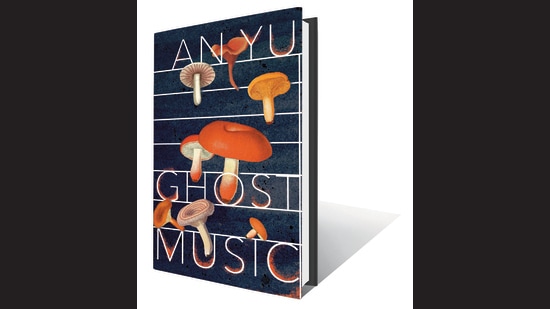Interview: An Yu, Author, Ghost Music - “I am drawn to the secrecy of mushrooms”
Chinese author An Yu’s latest novel, Ghost Music, uses the metaphor of mushrooms to reveal buried family secrets
Your debut novel, Braised Pork, had an intimate connection to the dish. Your new novel has exotic mushrooms as the dominant ingredient. What do the mushrooms signify?

I am immensely drawn to the secrecy of mushrooms. They live and thrive in the dark. Societies have always used fungi for different purposes — in healing, killing, entertainment, spirituality, the list goes on. I spent much time going through research and writing related to fungi, but there is still so much we don’t know about these things. The way they exist is truly fascinating.
Ghost Music is a story filled with secrets. There are things that happen that seem like coincidences, but you get the feeling that they are connected in some subtle, fateful way, as though they were always meant to happen in that manner. Things go on under the surface of these characters’ lives until they come out of nowhere and take over completely. A little like a mycelium, don’t you think?

What is your connection to food when it comes to writing fiction?
Writing about food comes quite naturally to me. A meal scene, apart from being really fun to write, can also shed light on so many relationship dynamics. They can be so powerful in describing family, love, intimacy, but also isolation, disconnection, loneliness. I also like to write on an empty stomach, so maybe hunger is the real reason here.
Your writing thrives on magic realism. Elements of existential crisis and symbolism are beautifully interspersed with real life twists and turns. From where do you draw inspiration?
For me, inspiration is mostly sparked by small moments in reading, art, music, life. It can come from a phrase in a book, a riff in a song, the angle at which the sun is shining on an object, or the way someone sneezes. There are stories, experiences, and emotions that I find challenging to write about in a direct way because I can’t seem to find the right words to describe them in a way that feels authentic. When that happens, I like to draw from the surreal. I find that leap of faith — to take something from the imagination and treat it as if it were real — is essential to understanding our existence.
Classical music features prominently in Ghost Music. What’s your connection to the piano and what kind of research did you do to write about it?
Luckily for me, I didn’t have to do too much research as I grew up with the piano. This novel, in a way, is really a love letter to classical piano music. Music as a way of artistic expression has always been close to me and having Song Yan have this relationship with the piano worked really well with her story.
Your protagonists in both the books (Braised Pork and Ghost Music) seem to have an estranged relationship with their partners. Even when they’re married to them, they don’t really know them. Do you see women as constantly trying to deduce their male partners?
I think we are all constantly trying to deduce those around us. It is in the nature of the human condition. I am intrigued by the idea of being a stranger to those we are closest with, and oftentimes, that person is a spouse. This image of sharing a bed with someone we hardly know is both literal and metaphorical of us being born alone in this world, in a single vessel that is our body, and thus never truly able to empathize with another person.
A lot of Bowen’s behavioural issues seem to stem from the fact that he has unresolved trauma from his childhood. What’s your perception of men and their inability to express their fears, and its consequent effect on the women in their lives (mothers, wives, etc.)?
Traditionally, in Chinese society, men are born with a lot of weight on their shoulders. Husbands are expected to be the pillar of the family. They are to be brave, to hide their vulnerabilities, to be a rock. It is considered shameful for a man to cry, and when they do, they are often told not to “be like a woman”. Such sentiments are undoubtedly carried over to modern day China, and as a result, it is not uncommon for men to suppress their emotions, viewing it as an essential aspect of manhood. As these emotions simmer and boil over, they inevitably carry consequences for themselves as well as those around them.
What does the orange dust in Yunnan signify? It is your attempt at tackling the important topic of climate change in the country and rest of the world? What did you have in mind while writing about it?
On the one hand, it is reminiscent of mushroom spores spreading; the secrets of the past haunting us. On the other hand, it reminds me of the power of nature and how small and insignificant we are in comparison, how it can bury us and destroy us overnight.
We see a fair bit of influence of the mother-in-law in the novel, in terms of what it means for a wife to keep a home in place, have children, focus on family, etc. Tell us a little about how women’s outlooks towards independence and prioritizing their careers over families have changed in China over the years.
It was widely acknowledged that the Communist Revolution brought more jobs to women throughout the country, but for a long time, women were still expected to shoulder domestic burdens like child care and cooking. As a result, women in my grandmother’s generation were often overloaded with responsibilities. It wasn’t until in more recent decades that women have begun to delay marriage or even reject it altogether in order to focus more on our careers. This, being a relatively new mindset, means that the previous generations still mostly believe in the importance of marriage and of having children, thus putting much pressure on their daughters who are unmarried. In a society where respecting the wishes of your elders is very much tied to moral righteousness, this clash in values between generations is a struggle that many career-driven women are inevitably going through at the moment.
Arunima Mazumdar is an independent writer. She is @sermoninstone on Twitter and @sermonsinstone on Instagram.





